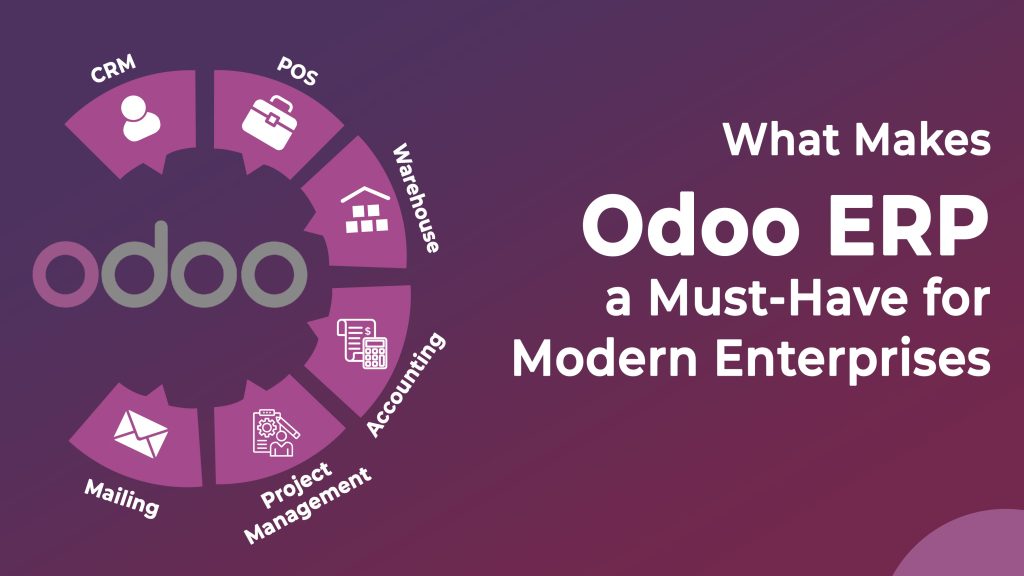
In today’s hyper-competitive business landscape, companies are constantly seeking tools to streamline operations, boost efficiency, and drive growth. Enterprise Resource Planning (ERP) systems have emerged as indispensable assets for achieving these goals. Among the many ERP solutions available, Odoo ERP stands out as a robust, flexible, and cost-effective platform tailored to meet the needs of modern enterprises.
This blog post delves into why Odoo ERP is a game-changer for businesses of all sizes. From its modular design to its scalability and cost-effectiveness, here’s everything you need to know about what makes Odoo ERP a must-have for contemporary enterprises.
What is Odoo ERP?
Odoo ERP is a comprehensive, open-source business management software that integrates various business processes into a unified system. Launched in 2005, Odoo has rapidly evolved, boasting a global community and over 7 million users across industries.
Key Features:
- Modular Architecture: Offers more than 50 applications, including CRM, accounting, inventory, manufacturing, and HR.
- Customizability: Open-source nature allows for seamless customization.
- Scalability: Scales to support startups, SMEs, and large enterprises alike.
Seamless Integration of Business Processes
One of the standout features of Odoo ERP is its ability to integrate diverse business functions under a single platform. This integration eliminates data silos, ensuring that teams across departments can access the same real-time information.
Benefits of Integration:
- Streamlined workflows for improved efficiency.
- Enhanced collaboration between departments like sales, finance, and HR.
- Reduced duplication of effort, saving time and resources.
For example, Odoo’s inventory management module can seamlessly sync with the sales and accounting modules, automating stock adjustments, invoicing, and financial reporting.
Scalability to Support Business Growth
Modern enterprises need tools that grow with them, and Odoo delivers on this front. Its modular nature allows businesses to start with basic functionalities and expand their use as needed.
How Odoo Enables Scalability:
- Add modules based on your evolving business needs.
- Handle increased data volumes without performance issues.
- Easily integrate third-party tools and plugins.
Whether you’re a startup looking to optimize core operations or a large enterprise managing complex supply chains, Odoo offers a tailored solution.
User-Friendly Interface
Unlike traditional ERP systems that can feel overwhelming, Odoo’s intuitive interface simplifies the user experience. Its clean design ensures that even non-technical users can navigate modules effortlessly.
Key Advantages:
- Minimal learning curve for employees.
- Mobile-friendly interface for on-the-go accessibility.
- Real-time dashboards provide actionable insights.
This ease of use significantly reduces the time and cost involved in onboarding and training, helping businesses achieve a faster ROI.
Cost-Effectiveness
ERP systems are often associated with hefty implementation costs, but Odoo breaks this stereotype. Its open-source foundation and modular pricing model make it accessible to businesses of all sizes.
Cost-Saving Highlights:
- Open-source community version: Free to use with basic features.
- Pay-as-you-go model: Only pay for the modules you need.
- Reduced licensing and maintenance costs compared to traditional ERPs.
With Odoo, even small businesses can afford a powerful ERP solution without compromising on functionality.
Flexibility and Customization
One of the main reasons enterprises gravitate toward Odoo is its unparalleled flexibility. As an open-source platform, it can be customized to meet specific industry requirements, from manufacturing to retail.
Examples of Customization:
- Tailor workflows to align with your business processes.
- Integrate APIs for specialized functionality.
- Create custom dashboards for better monitoring.
For industries with unique demands, such as healthcare or logistics, Odoo’s customization capabilities ensure a perfect fit.
Comprehensive Reporting and Analytics
Data-driven decision-making is a cornerstone of modern business success. Odoo ERP provides robust reporting and analytics tools to help enterprises gain deep insights into their operations.
Reporting Features:
- Pre-configured and customizable reports across all modules.
- Real-time analytics for quick decision-making.
- Visualization tools like graphs and charts.
These insights enable businesses to identify inefficiencies, forecast trends, and make informed strategic decisions.
Community and Ecosystem Support
Odoo boasts a vibrant global community of developers, consultants, and users, which ensures constant updates, innovations, and support. Additionally, its marketplace offers a wide range of third-party apps to enhance functionality further.
Community Benefits:
- Regular updates and bug fixes.
- Access to a pool of developers for custom solutions.
- Extensive documentation and forums for troubleshooting.
This ecosystem makes Odoo a future-proof solution for enterprises aiming to stay ahead of the curve.
Cloud and On-Premise Deployment Options
Odoo offers both cloud-based and on-premise deployment options, catering to businesses with varying IT infrastructure requirements.
Why This Matters:
- Cloud Deployment: Ideal for businesses seeking flexibility and reduced IT overhead.
- On-Premise Deployment: Suitable for enterprises with strict data control and compliance needs.
This dual approach ensures that businesses can implement Odoo ERP in a way that aligns with their operational preferences.
Conclusion: A Smart Investment for Modern Enterprises
In a world where efficiency and agility are paramount, Odoo ERP empowers businesses to stay competitive. Its modular design, affordability, and scalability make it a must-have for modern enterprises looking to streamline operations, reduce costs, and drive growth.
If you’re ready to elevate your business with a versatile ERP system, Odoo is the solution you’ve been waiting for. Its user-friendly interface, comprehensive features, and strong community support position it as a leader in the ERP space.
